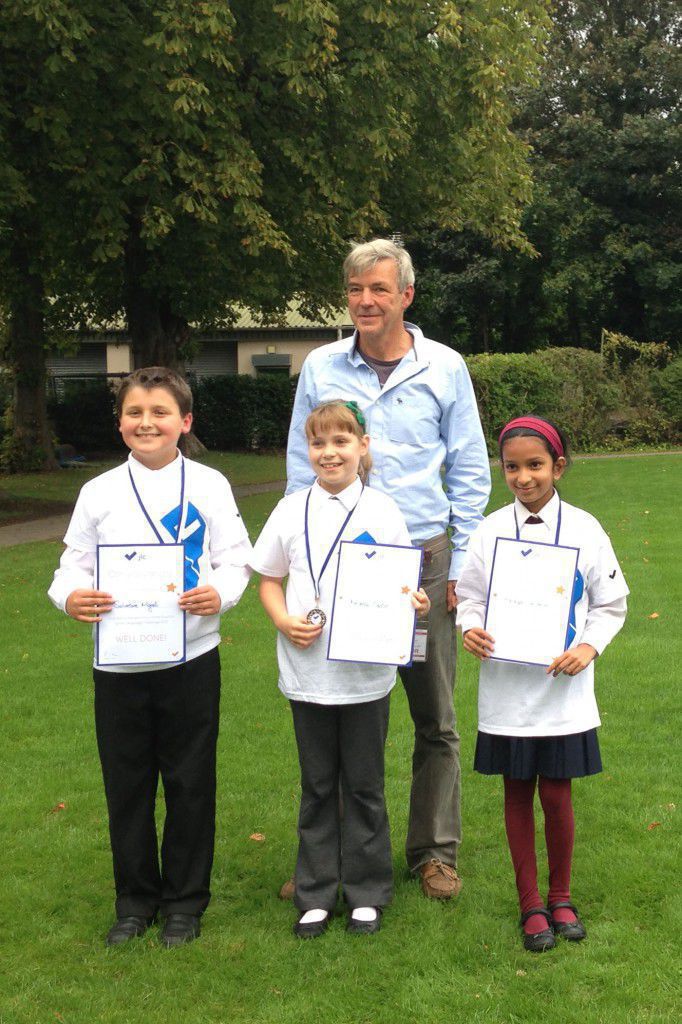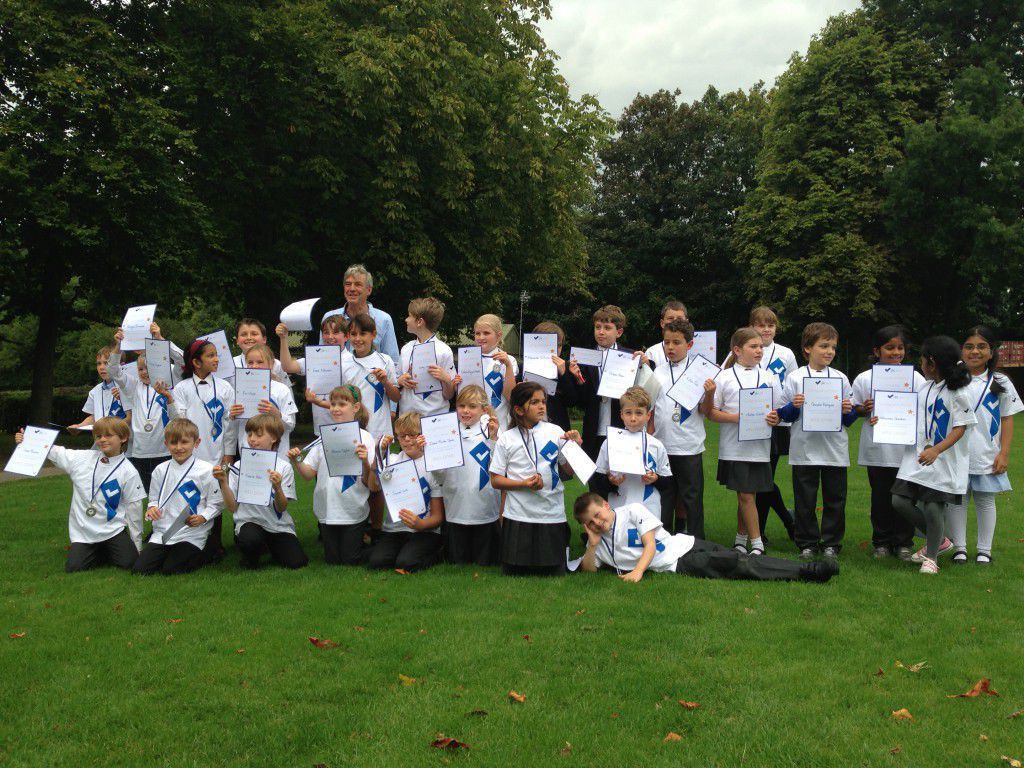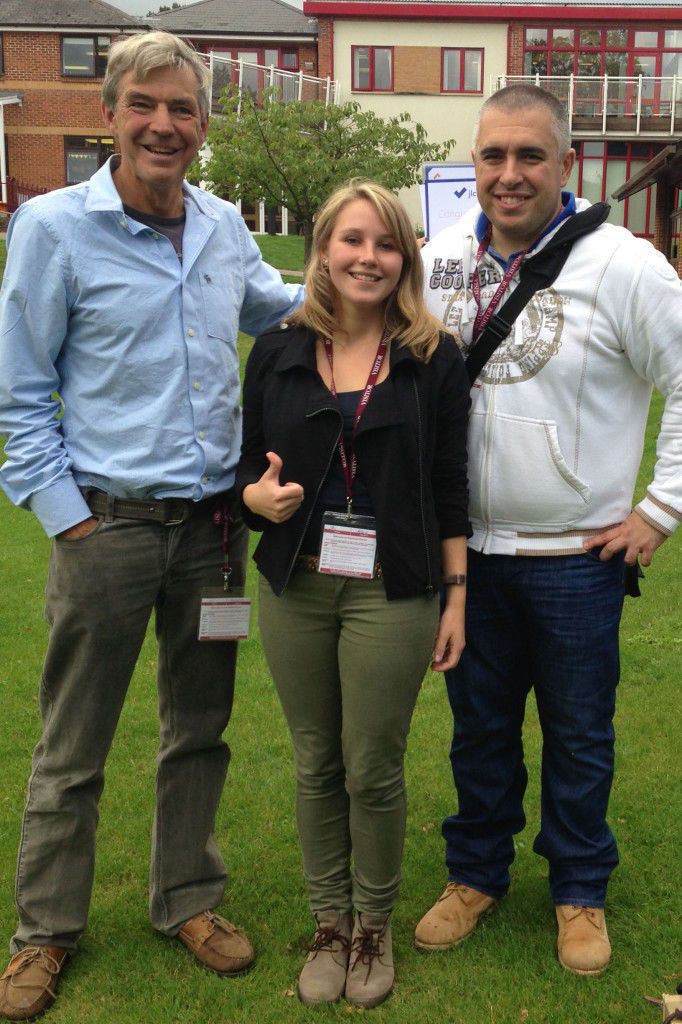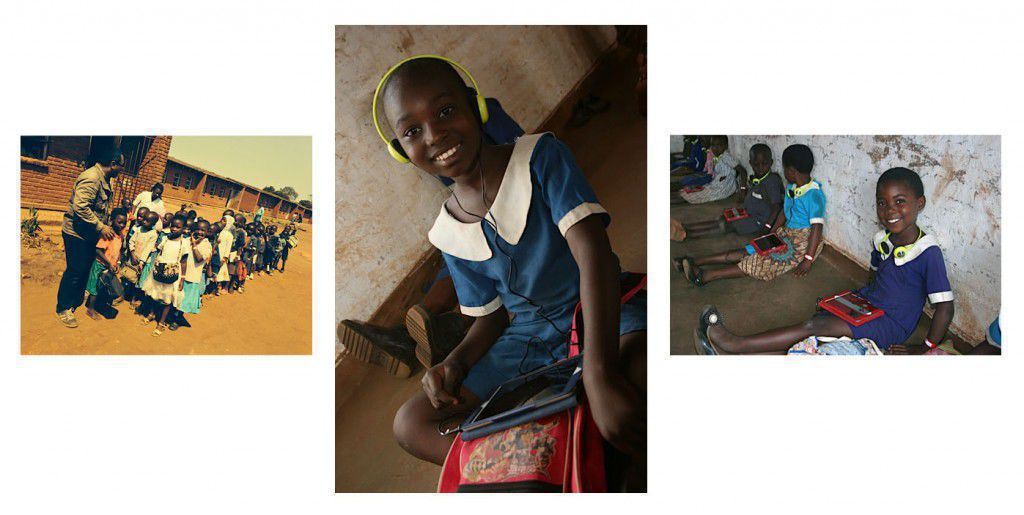Getting to know you: ‘Hallo’ from Lorena
My name is Lorena and I am from Germany. I just finished school and now I’ve started a placement at EuroTalk for five months. This is my third week in the company and it is very exciting. I am working on a project to help EuroTalk promote their maths apps in Germany. I’m having fun thinking about this task and I have a lot of ideas!
On my third day at EuroTalk, Wednesday 18th September, I went to the Junior Language Challenge at the Cranmore School in Surrey. It was the semi-final for London (South). At one o’clock we arrived at the school and prepared the iPads so that the children could use the Greek app.
About thirty thrilled children were ready to start! 🙂
… And after the welcome, it was finally happening.
The children were split up in two groups of thirteen and each group played the games. The children with the best score came into the final. The teachers and some parents could follow which position the children were in, because there was a whiteboard with the current score. For the children it was a very exciting situation and the teacher and parents were pretty curious.
After the challenge I saw only smiling kids! They were so happy and very proud of the certificates they got from EuroTalk.
And for me was it an interesting day and I got some impression of how EuroTalk promotes languages for children.
Lorena
A step closer to one billion children
If you’ve been on our Facebook or Twitter page recently, you may have noticed some of our photos from our recent trip to Malawi. Although some members of our office are convinced we went over there to buy beans for our new coffee machine, we were actually there to run an evaluation on the success of our maths apps in schools there. Myself, Jamie, Andrew and Nicola Pitchford from Nottingham University spent 10 days in Lilongwe, Malawi’s capital, testing around 400 Malawian kids at Biwi primary school on basic maths and motor skills, as well as asking them questions about their aspirations and how they feel about school life in general.
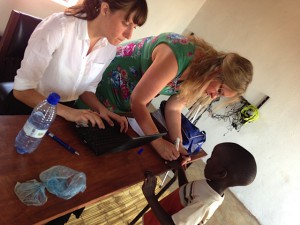 If you have never tried to register the names and details of hundreds of small children, and chase them all down to put the right coloured and named wristbands on each one, you might struggle to imagine the level of chaos that we experienced, with several kids coming back to try and get their photos taken twice, some losing or destroying their wristbands after just one day, and our complete inability to spell Malawian names!
If you have never tried to register the names and details of hundreds of small children, and chase them all down to put the right coloured and named wristbands on each one, you might struggle to imagine the level of chaos that we experienced, with several kids coming back to try and get their photos taken twice, some losing or destroying their wristbands after just one day, and our complete inability to spell Malawian names!
However, somehow we managed this massive task, and got down to business putting the children into groups (a red group, who will use our maths apps for 8 weeks, a blue group who will use other fun, but non-maths, apps, and a pink group who will carry on with teaching as usual). After this, we began to assess the children, running our specially-designed evaluation app on groups of around 50 children at a time.
Thanks to Nicola’s amazing organisational skills and hard work from everyone, we managed to assess all the children who are part of the study in just three days, albeit with our stress levels a little higher at the end of several hours of using our rather basic knowledge of Chichewa to explain to kids how to use their shiny new ipads (or ‘gadgets’ as they call them!). The red group will now have 8 weeks to use the Masamu (maths) apps for a few hours each week, and we will be back to assess their progress in November!
We all had an amazing time in this beautiful country, and it was fantastic to see the level of interest that there is in our project. I was particularly happy to see how far some of the children got with the assessment tasks, and how hard some of them concentrated on getting the right answers, and trying out a range of new tasks that they would never normally be asked to do. There is clearly a lot of natural maths talent there, so we’re extremely excited to see the progress that they make with the extra teaching and support we are giving them during the study.
Make sure you check out our Flickr account for loads of pictures of the goings-on at Biwi school!
Alex
Why I love the JLC
Many people will already be aware of the national languages competition organised by EuroTalk each year, called the Junior Language Challenge. It’s open to all children aged 10 and under, and gives them an opportunity to learn three new languages and compete against other children from their region and ultimately from across the country.
The JLC starts in March and finishes with the final in October. And it’s a lot of work – from a technical point of view (our programmers have literally had sleepless nights getting the software up and running in time) and in terms of organisation. Running a competition like this isn’t an easy task, and with the semi-finals taking place over the next two weeks and the final still to come, it’s only going to get busier.
But I still love the JLC, and here’s why…
Firstly, the children taking part really enjoy it. It’s lovely for us to see their enthusiasm at the regional semi-finals and the grand final in London. Tension’s always high and sometimes there are even tears, which obviously isn’t a good thing in itself, but it does show how passionate the children have become about the competition. In 2011, Ben Fawcett from Chichester even returned early from his family holiday at Disneyworld to compete in the final – that’s what you call dedication.
Secondly, it gives children a love for languages that they can take with them into their future studies and career, and that they might otherwise have missed out on. Marliese Perks from Edinburgh, who reached the final in 2004, wrote to us shortly before she left for university to study Law and Spanish: ‘The competition inspired me to learn languages … little did I know at that age that Spanish and languages would ultimately become my passion … I can’t say thank you enough, you set me on this path and I am loving every minute of it!’ This is the goal of the JLC – to let children know that they can learn languages, and that it can be fun. Not only that but they don’t have to just learn the ones they’re taught at school; Marliese learnt Spanish, Greek and Saami. I’m not sure how often she uses her Saami these days, but what’s important is the JLC showed her she had the ability to learn it, which I think is pretty inspiring.
And finally, there’s a whole other side to the JLC. Each child who enters pays £2.50, and this money is used to purchase tablet devices for schools in Malawi, where class sizes are so huge, it makes teaching a near-impossible task. A tablet that can be shared by several children will fill the gap left by over-stretched teachers, and as a result will literally change lives. A basic education is something that every child should have, no matter where in the world they are, and the competition not only provides opportunities to youngsters in the UK, but it also makes a huge difference for children in Malawi too. I’m proud to be a part of it – albeit a slightly stressed out, panicked part.
To everyone preparing for a semi-final, good luck! To those who’ve already made it through to the final – congratulations, and see you in October 🙂
And to everyone who’s taken part in the JLC – not only in 2013, but every year – thank you.
Liz
Language learning in UK schools: what does the future hold?
Recent news that the numbers of pupils taking a modern foreign language to A-level in the UK have fallen dramatically did not come as a huge surprise to me. According to the latest A-level results, there has been a 9.9% fall in candidates taking French, and an even more depressing 11.1% fall in those taking German A level.
This trend has been coming along for quite some time now, but why?
First and foremost, the general attitude to language learning at a societal and educational level is very poor. To native English speakers, languages are often seen as a ‘waste of time’, as ‘everyone speaks English’. Well, allow me to dispel that notion! Although there are a lot of fantastic English speakers out there, only 22% of Spaniards, 39% of French people and 34% of Italians (for example) can speak English to a conversational level. The rates are higher in Scandinavian countries, but by no means everyone even has a basic command of English, let alone full fluency. The idea that it is ‘useless’ is even more ridiculous – even if other people do speak great English, that’s no excuse for being the person pointing at things mutely on holiday, let alone for UK politicians and businesspeople refusing to communicate with business partners and policial allies in their own tongue.

Secondly, languages are not taught well in many of our schools, and are not particularly encouraged. I was lucky enough to study French, German, Spanish and Japanese at GCSE, but there are many schools that only offer French, and even this is not compulsory. Languages are portrayed as difficult and often seen as being less necessary than maths, science etc. Whilst of course maths and science are vital, languages are essential to communication at every level, whether that is your holiday to France or a financial deal between Germany and the UK. Children also don’t start learning a language until they are around 12, when the best years for natural language absorption are coming to an end, and when teens often become self conscious about speaking a new language in front of school friends. I know I was very nervous about my oral exams at school, and still struggle to be very chatty in another language when I know I might make mistakes!
Here at EuroTalk we know that languages are not only essential but also loads of fun! So what’s the solution? Fortunately it seems that GCSE uptake of languages is on the increase, so maybe there is still hope. But from my perspective we need to introduce languages at a much earlier age in schools, offer a wider range of languages such as Mandarin and Arabic (both official UN languages), create a more open culture of chatting in another language without feeling embarrassed and worried about mistakes, and dispel the ridiculous notion that any other language than English is useless. Even if everyone else in the world learns English, we should be ashamed not to return the favour and at least have a go at saying ‘hi’ in their mother tongue.
Alex
Learning a new language will make you smarter
Today’s post was written by Tom, who’s just spent a year working at EuroTalk as part of his university degree course. He’s been doing some research on some of the less obvious – but just as important – benefits of learning a language.
Most people would agree that knowing more than one language in today’s increasingly connected and global world is a good thing. However, new reasearch suggests that it can make you smarter in other, less obvious ways.
 Knowing more than one language seems to improve the brain’s executive functions, which include: planning, working memory, attention, problem solving, verbal reasoning, task switching and the initiation of tasks. That all seems very positive to me!
Knowing more than one language seems to improve the brain’s executive functions, which include: planning, working memory, attention, problem solving, verbal reasoning, task switching and the initiation of tasks. That all seems very positive to me!
This means that bilingualism can improve your brain in a multitude of brilliant ways. The evidence for this concensus is not limited either; there are plenty of studies that suggest studying another language can make you smarter.
One study shows us that students of a foreign language score better in standardised tests – particularly in maths, reading and vocabulary.
Another by the psychologists Ellen Bialystok and Michelle Martin-Rhee shows us that bilingual children are better at solving certain mental puzzles. And research by psychologists at Penn State suggests that you build better multitasking skills.
These benefits can extend well into your later years. Neuropsychologists from the University of California, San Diego have discovered bilingual people are more resistant than others to the onset of dementia. This resistance is also related to the degree of bilingualism. Those with a better understanding of their second language are more likely to stave off the effects of the disease, so, we should all start learning today.
Many scientists are starting to compare the brain to a muscle in that it gets stronger with exercise. Learning a new language is certainly a workout and can improve your life in multiple ways. It can open your eyes to many more opportunities and experiences and the journey towards fluency can be incredibly rewarding.
If you can’t decide what new language you want to start learning, take a look at our list of 132 languages; you can start learning with us instantly.
Tom
